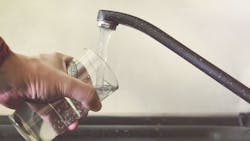Survey: Communication is key for tap water consumers’ perception of safety
Consumers who remember receiving a recent communication from their water utilities are more than three times as likely to report their water’s safety has improved, according to a survey conducted by Morning Consult on behalf of the American Water Works Association (AWWA).
The May 2023 poll, called “Public Perceptions of Tap Water,” included responses from 2,022 adults served by water utilities in the United States.
71% of respondents view their home’s tap water as safe, which is consistent with the level measured in the June 2022 survey. 19% of all respondents indicated they felt their tap water is unsafe. One-quarter of Black respondents (23%) and Hispanic respondents (25%) report feeling their tap water is unsafe, compared to only 18% percent of White respondents.
Both Hispanic and White respondents express a four-percentage point increase since last year in reporting that the safety of their water has gotten better over the past five years. However, Hispanic respondents also expressed a five-percentage point decline since last year and 17% since June 2020 in saying the water at the faucet is safe.
“The one thing that’s clear year-over-year from the Public Perceptions of Tap Water survey is that a utility that communicates frequently will have greater trust from its customers and in its community,” said AWWA CEO David LaFrance. “It’s also clear that trust is not equal across all demographics, so there’s still work to do to assure high levels of trust with all customers. Getting there requires not only first-rate communications, but a relentless focus on providing excellent water quality and services to everyone.”
Further highlighting the importance of communication, those who recall receiving communication are significantly more aware of their water utility’s efforts to make various improvements. Those who recall receiving communication are 36% more likely be aware of their water utility’s efforts to improve water quality/clarity, as well as know their tap water meets or exceeds federal or state requirements.
Affordability remains a significant issue among respondents. Half of respondents ages 35-44 (51%) and two-in-five respondents ages 18-34 (41%), urban respondents (43%), Hispanic respondents (42%), and respondents who personally pay their water bill (39%) report they struggle to pay their water bill on time. Compared to last year’s survey, six percent more White respondents (37%) report struggling to pay their water bill on time. Additionally, two percent fewer Hispanic respondents (42%) and seven percent fewer Black respondents (37%) report struggling to pay their water bill on time compared to last year’s survey.
The poll was conducted between May 9-11, 2023, and it reflects a sample of 2,022 adults receiving water from a public water supply. The interviews were conducted online. Results from the full survey have a margin of error of +/- 2 percentage points.
